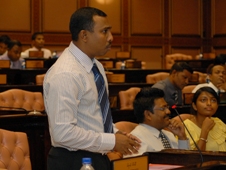Over a thousand letters requesting a ban on the sale of alcohol in inhabited islands were submitted to the president’s office today by a coalition of NGOs campaigning against revised regulations to grant liquor licenses to tourist hotels.
Speaking to press outside the president’s office, Mauroof Zakir, spokesperson for the coalition, said the NGOs had decided to send a letter to the president and create a petition.
“These are only the letters we got in a short period of time,” he said. “It’s not just from the civil society associations, but from the public who are not involved in the associations.”
He added the members of the public who sent the letters wanted to show that they did not want alcohol sold in inhabited islands.
“The letter mainly notes the dangers of selling alcohol in inhabited islands and [is intended] to show that the public does not support this,” he said.
He said the NGOs did not believe the government has listened to their concerns.
Revised regulations
Last month, the ministry of trade and economic development revised regulations on the use and import of alcohol to authorise its sale in tourist hotels with 100-beds in inhabited islands.
But the regulations were withdrawn shortly afterwards, following a public outcry and opposition from the Islamic ministry.
The regulations were sent to a parliamentary committee for advice and consultation, which has since approved it.
Meanwhile, a bill proposed by Independent MP Ibrahim Muttalib to ban the sale of alcohol in inhabited islands was rejected by parliament, with MPs arguing it was unconstitutional as it would indirectly authorise its sale.
Article 10(b) of the constitution states no law contrary to any tenet of Islam shall be made or enacted.
The economic development ministry has argued that the regulations were revised to revoke over 800 liquor permits to expatriates, which has created a black market for alcohol in the capital Male’.
The permits will be revoked in favour of allowing the sale of alcohol to foreigners under strict supervision, they said.
Under the regulations, hotels with over 100 beds would be allowed to have a bar that is not visible from outside and would only serve foreigners.
Furthermore, it will be illegal to keep alcohol in mini-bars at the hotels on inhabited islands or sell it anywhere apart from the hotel’s main bar.
Maldivians cannot be employed at the bar and all employees of the bar must be registered with the economic development ministry after a police check.
An inventory of the alcohol in storage and daily sales must be maintained and made available to police on their request, while CCTV cameras must be mounted in the storage room at the hotel.
The people’s representatives
Speaking to Minivan News today, Mohamed Zuhair, president’s office press secretary, said MPs on the parliamentary committee would have taken the religious implications of the regulations into consideration and the NGOs should respect the will of the people.
“We always respond to letters that are sent to the president’s office,” he said. “But, while we respect the NGOs, they too have to respect the decision of the people, and that is the decision of the People’s Majlis,” he said.
Zakir said parliament rejected a bill on outlawing the sale of alcohol in inhabited islands by “making excuses and misleading the people”.
“But, we learned that the regulations were withdrawn on the order of President Nasheed when it was first publicised,” he said. “We believe President Nasheed will do this on the request of citizens to fulfill his campaign pledge to close all doors to drugs and that he will he will close this door as well.”
Sheikh Ali Zahir, a member of the fiqh academy, said the letters were “very respectfully” drafted and “begs” the president to not enforce the regulations.
“We hope that we will get a good reaction and that he will give a response,” he said. “We hope very much that he will fully respond to our appeal to protect the beloved Muslim communities of the Maldives.”
The coalition now includes over 80 NGOs and associations, he said.
Zahir said the coalition believes the “majority” of Maldivians would support the appeal as Maldivians are 100 per cent Muslim.
